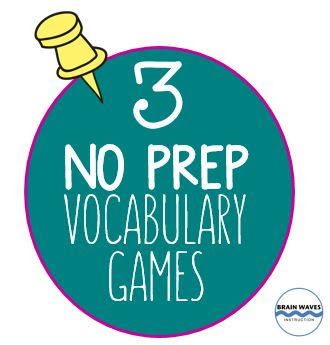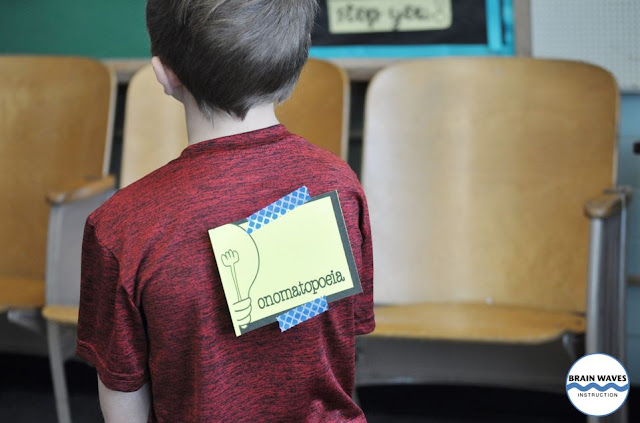As the old adage goes, if you teach a man to fish, he eats
for a lifetime. It turns out the same can be said about a student’s vocabulary:
Teach her what a word means, and she’ll become a stronger reader.
Even better, say researchers, teach your students what eight
to 10 words mean, over the course of 37 to 50 weeks, and even your lowest
readers could experience a 30 percent increase in word knowledge… And the more
words your students know, the more likely they are to comprehend what they
read.
But as any of us who has memorized lists of vocabulary words
knows, it can be – well, boring. As with many things school-related, the key to
your students’ success with building their vocabularies is to make it fun!
Check out these three No-Prep, No-Hassle, No-Excuses
Vocabulary Games you can use with any sets of words. Tip: These work best as a review, after students have already heard
the words and had a chance to use them (either during class warm ups or in homework). And...great news! I've compiled everything you need to play the games in an EXCLUSIVE FREEBIE!
Guess Who?
Write the vocabulary words on index cards (or have students
do this). Here's a set of figurative language vocabulary cards...
Without letting the students see, tape the cards to their
backs.
Have the students walk around the room and give clues to one
another about the word on their backs. (For example, if Sam is wearing the
word “onomatopoeia,” his partner may say, “The bacon sizzled in the frying pan.” Sam then
takes a guess at what the word is. And so on.)
When In Doubt, Bluff
Divide your class into two teams. Write a vocabulary word on
the board or write the words on cards and just display them inside this poster...
Students who know the definition should stand up. Students who are
bluffing and don’t know the definition also should stand. (Students who are
unsure also may remain seated.) Call on a student at random to define the word.
If the student gets it, his team gets points for every team member that is
standing. If the student does not get it, the team loses points for every team member standing. The team with the most points at
the end wins.
Fast Talker
Type the vocabulary words onto a SmartBoard or Powerpoint template
(or use a visualizer) and project each word, one at a time, so the class can
see it. Or, write the words on strips of paper for students to pull out of a bag or basket.
Once students have a word, instead of asking for the definition of the word, call out alternative
commands:
·
Part of
speech
·
Synonym
·
Antonym
·
Roots
·
Use in a
sentence
(You can also write those commands on a beach ball and have
students toss it to each other as you go through the words.) Or, you can put the commands on a paper cube that students roll for their "vocabulary fate."
See how quickly
the students can come up with an answer as you randomly call on them.
It's a great idea to keep throwing in old words as the year progresses, so your
students have a better shot of retaining the vocabulary words. Consider giving
points or prizes when students identify vocabulary words in their reading
material or outside of class.
They’ll have fun. They’ll become better readers. And you
won’t break a sweat! Everyone wins!
Since we're on the topic of vocabulary, I thought I'd share my favorite way to teach vocabulary words. It's through doodling!
Yes, doodling! I've found that combining vocabulary instruction with doodles...and then writing, is an amazing way to expand students vocabulary.
I even created a set of 160 Daily Doodle Vocabulary words for grades 3-5 and grades 6-8.
Since we're on the topic of vocabulary, I thought I'd share my favorite way to teach vocabulary words. It's through doodling!
I even created a set of 160 Daily Doodle Vocabulary words for grades 3-5 and grades 6-8.
Ready for your freebie? Just click HERE for a set of vocabulary word cards, a poster, and the vocab cube.
Thanks for stopping by!
Mary Beth
















No comments:
Post a Comment